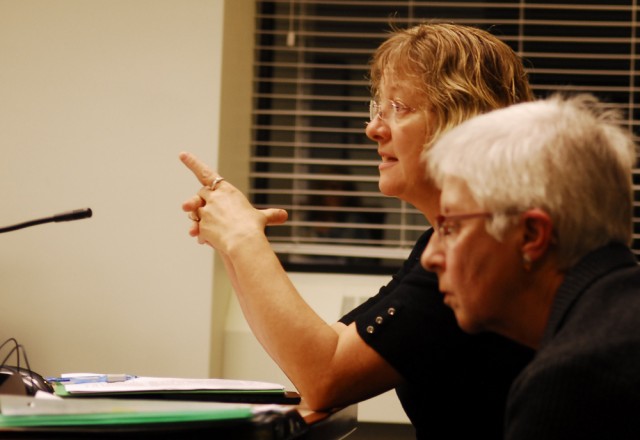Referenda looms for library service
By Timothy Schafer, The Nelson Daily
Saying ‘No’ to the Oct. 16 Nelson Municipal Library referenda would mean a doubling in the cost of rural memberships, and prolonging an unworkable situation that will ultimately test the viability of continuing a municipal city service for rural residents, say two library proponents.
Both the chairperson of the Nelson Municipal Library board and its chief librarian laid out the literary landscape as the day of the referenda (Oct. 16) nears for areas E, F and south H in the Regional District of Central Kootenay.
Dianne Harke and June Stockdale told city council at its committee of the whole meeting Monday night in council chambers, the referenda on the future of library services in rural areas must pass, or both the city’s library and rural residents will suffer.
With membership fees ($65 per year) accounting for two per cent of the library’s budget, and up to 30 per cent of the users coming in from rural areas, the delivery of the service is proving unsustainable and must change, said Harke.
“What we have is a library budgeted on a population of 10,000 but we are actually serving 21,000 people with the amount coming in from the rural areas,” she said.
“This is really putting a strain on the situation.”
If the referenda do not pass, the board does not see the user pay system as a viable, sustainable option to provide service to the rural areas, Harke added.
“The reality is we cannot carry on the way it is. But, as a public institution, we cannot have a burly security guard at the door asking to see people’s residency and documents.”
The cost of the new tax assessment for rural library service works out to $10.30 per $100,000 of property assessment, the second lowest library tax assessment in the Kootenay region, Stockdale told council. The contribution from Nelson city residents would remain the same.
But a ‘No’ vote would mean the membership rates would nearly double (to $120 per year) for rural areas, while library services would suffer. The library misses out on over $60,000 in money from the province because they are paid per capita — a figure that presently cannot include the rural population it serves.
“(Raising memberships) is not really a viable option but it is the option that we had to come up with because we feel it would lower the memberships (from rural areas),” Stockdale said.
“We would get fewer people because fewer people could afford it, and it would stop this problem with not being able to manage the workload that is coming our way because of the high volume of people from the rural region.”
A ‘Yes’ vote will mean rural residents would no longer have to purchase a membership for the library and they would gain equal access, in addition to a satellite service being set up in the Slocan Valley and up Kootenay Lake.
The ‘Yes’ vote also means improved hours and service at the library, an expanded collection for borrowing, shut-in service for people who cannot leave their homes, more services through the schools, and rural representation on the library board of trustees.
On Oct. 16 residents will vote on whether they want to contribute to the library through local taxation. Three separate referenda will be held with each electoral area making its own decision.
This means residents in each area that pass its referendum will realize universal access to library services. The locations of where to vote have been advertised and are posted on http://rdck.bc.ca/publicinfo/news.html.
On Friday Oct. 1, the library will be hosting an open house on the services it provides, as well as a look inside the newly renovated library facility.

























